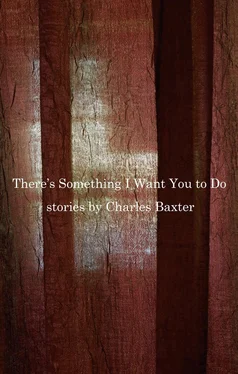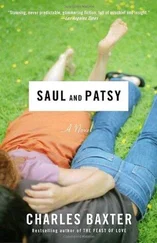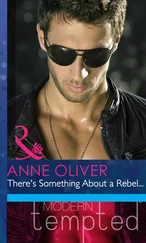Back in his friend’s basement, Quinn examined the wallet’s contents. His hands were trembling again, and he couldn’t see properly, and he wasn’t sure he was awake, but he could make out that the name on the driver’s license was Benjamin Takemitsu. The man didn’t look Japanese in the driver’s license photo, but Quinn didn’t think much about it until he’d finished counting the cash, which amounted to $321, an adequate sum for a few days’ relief. At that point he gazed more closely at the photo and saw that Takemitsu appeared to be intelligently thoughtful. What had he done to this man? Familiar pain flared behind Quinn’s knees and in his neck, punishment he recognized that he deserved, and the pain pushed out everything else.
He called his boyfriend in Seattle. In a panic he told him that he had robbed someone named Benjamin Takemitsu, that he had used a baseball bat. The boyfriend said, “You’ve had a bad dream, Matty. That didn’t happen. You would never do such a thing. Go back to sleep, sweetheart, and I’ll call you tomorrow.”
After that he lay awake wondering what had become of the person he had once been, the one who had gone to Africa. To the ceiling, he said, “I am no longer myself.” He did not know who this new person was, the man whom he had become, but when he finally fell asleep, he saw in his dream one of those shabby castoffs with whom you wouldn’t want to have any encounters, any business at all, someone who belonged on the sidewalk with a cardboard sign that read HELP ME. The man was crouched behind a tree in the dark, peering out with feverish eyes. His own face was the face of the castoff.
Somehow he would have to make it up to Benjamin Takemitsu.
—
In The Lower Depths, when Quinn entered, Black Bird did not look up. He was seated in his usual place, and once again his finger was traveling down the page. Cymbeline this time, a play that Quinn had never read.
“It’s you,” Black Bird said.
“Yes,” Quinn said.
“Did you bring a book of your own?”
“No.”
“All right,” Black Bird said. “I can’t say I’m surprised.” He then issued elaborate instructions to Quinn about where in the men’s room to put the money and when he, Black Bird, would retrieve it. The entire exchange took over half an hour, though the procedure hardly seemed secret or designed to fool anyone. When Quinn finally returned to his basement room, he had already gulped down two of the pills, and his relief soon grew to a great size. He felt his humanity restored until his mottled face appeared before him in the bathroom mirror, and then he realized belatedly what terrible trouble he was in.
Two days later he disappeared.
2.
That was as far as I got whenever I tried to compose an account of what happened to Matty Quinn — my boyfriend, my soul mate, my future life — the man who mistakenly thought I was a tightwad. I was very thrifty in Ethiopia, convinced that Americans should not spend large sums in front of people who owned next to nothing. But to Matty I would have given anything. Upon his return to Minneapolis he had called me up and texted and e-mailed me with these small clues about the medical ordeal he was going through, and I had not understood; then he had called to say that he had robbed this Takemitsu, and I had not believed him. Then he disappeared from the world, from his existence and mine.
Two weeks later the investigating officer in the Minneapolis Police Department (whom I had contacted in my desperation) told me that I could certainly come to survey the city if I wished to. After all, this Officer Erickson said, nothing is stopping you from trying to find your friend, although I understand that your permanent home is in Seattle and you do not know anyone here. It’s a free country, so you’re welcome to try. However, circumstances being what they are, I wouldn’t get your hopes up if I were you. The odds are against it. People go missing, he said. Addicts especially. The street absorbs them. Your friend might be living in a ditch.
He did not say these words with the distancing sarcasm or condescension that straight men sometimes use on queers. He simply sounded bored and hopeless.
Matthew Quinn. First he was Matt. Then he was Matty. These two syllables formed on my tongue as I spoke his name repeatedly into his ear and then into his mouth. That was before he was gone.
This is how we’d met: I had come by the clinic, the one where he worked, to deliver some medical supplies from the company I was then working for, and I saw him near a window whose slatted light fell across the face of a feverish young woman who lay on a bed under mosquito netting. She was resting quietly with her eyes closed and her hand rising to her forehead in an almost unconscious gesture. She was very thin. You could see it in her skinny veined forearms and her prominent cheekbones. On one cheekbone was a J-shaped scar.
Close by, a boy about nine years old sat on a chair watching her. I had the impression that they had both been there, mother and son, for a week or so. Four other patients immobilized by illness were in other beds scattered around the room. Outside a dog barked in the local language, Amharic, and the air inside remained motionless except for some random agitation under a rattling ceiling fan. The hour was just past midday, and very hot.
That’s when I noticed Quinn: he was approaching the woman with a cup in his hand, and after getting himself underneath the mosquito netting, he supported her head as he helped her drink the water, or medicine (I couldn’t see what it was), in the cup. Then he turned and, still under the mosquito netting, spoke to the boy in Amharic. His Amharic was better than mine, but I could understand it. He was saying that the boy’s mother would be all right but that her recovery would take some time.
The boy nodded.
It was a small, simple gesture of kindness, his remembering to speak to that child. Not everybody would go to the effort. Even when the woman’s husband arrived — sw  eaty, gesticulating, his eyes narrowed with irritation and fear — to complain about the conditions, Quinn smiled, sat him down, and calmed him. Soon the three of them were speaking softly, so that I could not hear what they said.
eaty, gesticulating, his eyes narrowed with irritation and fear — to complain about the conditions, Quinn smiled, sat him down, and calmed him. Soon the three of them were speaking softly, so that I could not hear what they said.
Young white Americans come to Africa all the time, some to make money, as I did, others in the grip of mostly harmless youthful idealistic delusions. Much of the time, they are operating out of the purest postcolonial sentimenta  lity. I was there on business, for which I don’t apologize. But when I saw that this man, Matty Quinn, was indeed doing good works without any hope of reward, it touched me. Compassion was an unthinking habit with him. He was kind by nature, without anyone asking him to be.
lity. I was there on business, for which I don’t apologize. But when I saw that this man, Matty Quinn, was indeed doing good works without any hope of reward, it touched me. Compassion was an unthinking habit with him. He was kind by nature, without anyone asking him to be.
Sometimes you arrive at love before going through the first stage of attraction. The light from the window illuminated his body as he helped that sick woman and then squatted down to speak to the boy and his father. After that I found myself imprinted with his face; it gazed at me in daydreams. Here it is, or was: slightly narrow, with hooded eyes and thick eyebrows over modestly stubbled cheeks, and sensual lips from which that day came words of solace so tenderhearted that I thought: This isn’t natural; he must be queer. And indeed he was, as I found out, sitting with him in a café a week later over cups of the local mudlike coffee. He didn’t realize how his kindness and his charity had pierced me until I told him about my own vulnerabil  ities, and the erotic directions in which I was inclined, whereupon he looked at me with an expression of amused relief. When I confessed how the sight of him had stunned me, he said, very thoughtfully, “I can help you with that,” and he put his hand on my knee so quickly that even I hardly noticed the gesture.
ities, and the erotic directions in which I was inclined, whereupon he looked at me with an expression of amused relief. When I confessed how the sight of him had stunned me, he said, very thoughtfully, “I can help you with that,” and he put his hand on my knee so quickly that even I hardly noticed the gesture.
Читать дальше

 eaty, gesticulating, his eyes narrowed with irritation and fear — to complain about the conditions, Quinn smiled, sat him down, and calmed him. Soon the three of them were speaking softly, so that I could not hear what they said.
eaty, gesticulating, his eyes narrowed with irritation and fear — to complain about the conditions, Quinn smiled, sat him down, and calmed him. Soon the three of them were speaking softly, so that I could not hear what they said.










